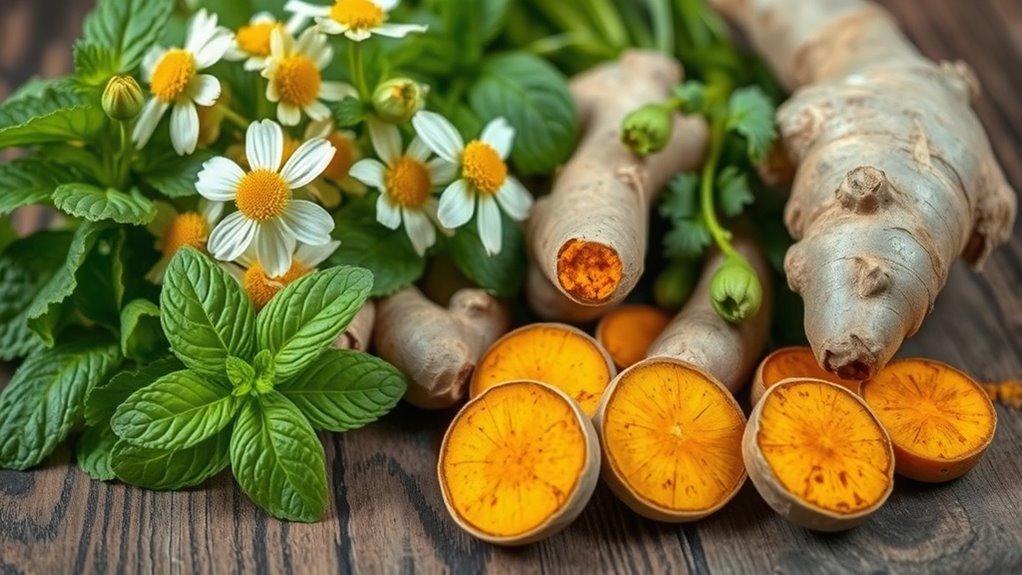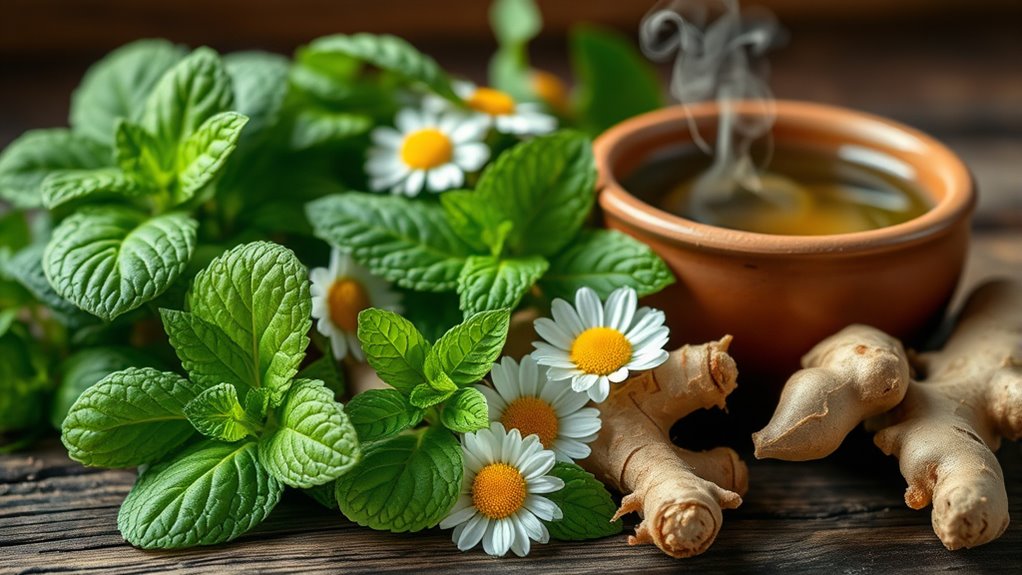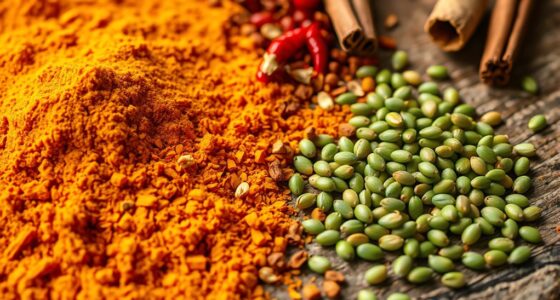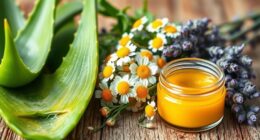To cool inflammation and soothe your gut, try herbs like chamomile, peppermint, fennel, ginger, and licorice. Chamomile relaxes muscles and reduces inflammation, while peppermint eases spasms and bloating. Fennel supports digestion and reduces gas, and ginger helps move food smoothly and reduces nausea. Licorice soothes inflamed tissues and heals mucosal lining. Incorporating these herbs as teas or supplements can bring quick relief, and exploring more options can help you find the best natural remedy for your gut health.
Key Takeaways
- Chamomile and peppermint herbs have anti-inflammatory and muscle-relaxing properties that soothe and cool inflamed gut tissues.
- Fennel seeds promote digestion and reduce gas, alleviating bloating and calming gut inflammation.
- Turmeric’s curcumin offers strong anti-inflammatory effects that help cool and reduce gut swelling.
- Licorice root supports mucosal healing and reduces irritation, calming inflamed gastrointestinal tissues.
- Herbal teas like chamomile, ginger, and turmeric provide gentle, cooling relief for gut inflammation.

If you often experience digestive discomfort, turning to natural remedies can provide relief. Many herbs have been used for centuries to soothe the gut, especially those that serve as antispasmodic remedies and digestive tonics. These herbs work by calming muscle spasms, reducing inflammation, and promoting a balanced digestive environment. Incorporating them into your routine might help ease symptoms like bloating, cramping, and indigestion more naturally than over-the-counter medications.
One of the most well-known herbs for calming the gut is chamomile. Its gentle anti-inflammatory properties help relax the muscles of your gastrointestinal tract, making it a popular choice for soothing cramps and spasms. Drinking chamomile tea after meals can help you unwind and reduce discomfort. Peppermint is another powerful herb that acts as an antispasmodic remedy. The menthol in peppermint relaxes smooth muscles and alleviates gas and bloating. Peppermint tea or capsules can be effective, especially if you experience frequent spasms or bloating.
Fennel seeds are often used as digestive tonics because they promote the proper movement of food through your gut. Chewing fennel seeds after meals can help reduce gas and bloating while supporting overall digestion. Licorice root is another herb that can soothe inflamed tissues in your gut, especially when taken as deglycyrrhizinated licorice (DGL). It helps strengthen the mucosal lining and reduce irritation, which is vital if you deal with chronic inflammation or gastritis. However, you should use licorice with caution, as excessive amounts can lead to elevated blood pressure.
Ginger is a versatile herb that functions as both a digestive tonic and anti-inflammatory agent. It stimulates digestion and helps move food smoothly through your system, reducing nausea and discomfort. Sipping ginger tea can be particularly effective if you’re prone to indigestion or nausea. Similarly, turmeric contains curcumin, a compound with strong anti-inflammatory properties. While turmeric is often used as a spice, taking it as a supplement or tea can help calm inflammation in your gut lining and support overall digestive health.
Additionally, recent cybersecurity vulnerabilities like the Microsoft outage demonstrate the importance of protecting digital systems, which parallels the need for safeguarding your health through natural and preventive measures. Incorporating these herbs into your daily routine can provide a gentle, natural way to soothe your gut. Whether you prefer teas, capsules, or chewables, these herbal remedies can complement your efforts to maintain a healthy digestive system. Always remember to consult with a healthcare professional before starting new herbal supplements, especially if you have existing health conditions or take medications. With consistent use, you may find relief from the inflammation and spasms that disrupt your comfort, helping you enjoy better digestion and overall well-being.
Frequently Asked Questions
Can These Herbs Replace Medication for Gut Inflammation?
You might wonder if these herbs can replace medication for gut inflammation. While herbal efficacy can be beneficial and help soothe symptoms, they shouldn’t completely substitute prescribed medication without your doctor’s advice. Relying solely on herbs might increase medication dependency or delay proper treatment. Always consult a healthcare professional to ensure safe and effective management of your condition, especially if you’re considering integrating herbs into your treatment plan.
Are There Any Side Effects From Long-Term Herb Use?
You wonder about the long-term safety of herb use, and it’s wise to take into account herb interactions and potential side effects. While many herbs are safe when used responsibly, prolonged use may lead to unintended effects, such as nutrient imbalances or interactions with medications. Staying informed, consulting your healthcare provider, and monitoring your body’s response help ensure that your herbal remedies support your health without causing harm over time.
How Quickly Can I Expect Relief Using These Herbs?
You might start noticing relief within a few days to a week, depending on your body’s response and the herbs used. The herb onset varies, so some herbs work faster, providing quicker relief, while others take longer. Consistently using these herbs as recommended helps speed up the relief timeline. Keep track of your symptoms, and if you don’t see improvement after a couple of weeks, consider consulting a healthcare professional.
Can These Herbs Be Combined With Other Herbal Remedies?
Picture a symphony where each instrument enhances the melody—that’s herbal synergy. Yes, you can combine these herbs with others, but be mindful of herb interactions. Some herbs may amplify effects or cause unwanted reactions. To guarantee safe, effective results, start with small doses and consult a healthcare professional. When done carefully, combining herbs can create a harmonious blend that boosts your gut health naturally.
Are These Herbs Suitable for Children or Pregnant Women?
You should always consider herb safety and pediatric considerations before giving herbs to children or pregnant women. Many herbs may not be suitable for these groups due to potential side effects or interactions. It’s best to consult with a healthcare professional who understands herbal medicine. They can guide you on safe dosages and appropriate herbs, ensuring you avoid any risks while soothing inflammation naturally.
Conclusion
By incorporating these herbs into your routine, you can truly transform your gut health and find relief from inflammation. Imagine banishing discomfort like a hero conquering chaos—your gut’s new best friend. Don’t wait for pain to take over; take action now and let nature’s gentle power soothe your insides. Your gut deserves this care, and with these herbs, you’re giving yourself the gift of comfort, wellness, and a life free from relentless inflammation.










